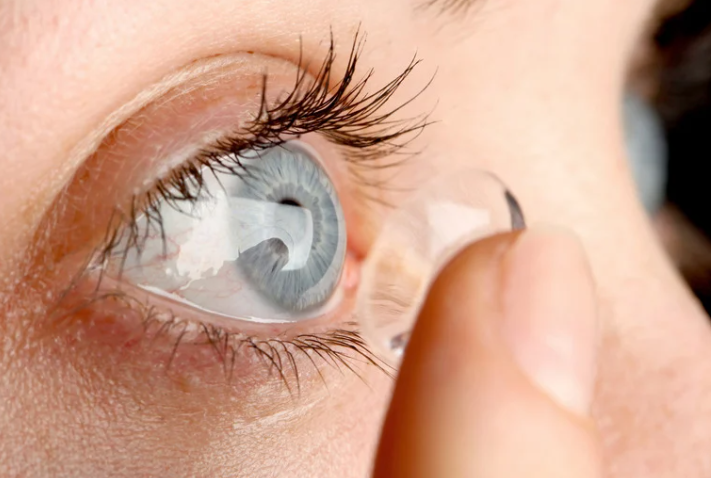Sleeping with contact lenses in your eyes can have serious consequences. While it might seem harmless, especially if you accidentally fall asleep with them once in a while, the risks to your eye health are significant. Let’s dive deep into what happens when you sleep with contacts and why it’s crucial to avoid this habit.
Why Sleeping with Contacts is Risky
Oxygen Deprivation
Contacts limit the amount of oxygen reaching your corneas. When you sleep, this oxygen supply is further reduced, as your eyes are closed and you aren’t blinking to refresh the tear film. This lack of oxygen can lead to hypoxia, which can damage the corneal cells and increase the risk of infection.
Increased Risk of Infections
Sleeping with contacts increases your risk of developing eye infections by six to eight times. This is because the reduced oxygen and moisture create a perfect breeding ground for bacteria and fungi.
Types of Infections
Bacterial Keratitis: Caused by bacteria such as Staphylococcus aureus and Pseudomonas aeruginosa, this infection can lead to severe pain, redness, and vision loss if not treated promptly with antibiotics.
Fungal Keratitis: More common in tropical areas, this infection can be caused by fungi like Fusarium, Aspergillus, and Candida. It requires antifungal treatment and, in severe cases, might necessitate surgery.
Acanthamoeba Keratitis: This rare but severe infection is often associated with poor contact lens hygiene and can lead to significant vision loss.
Corneal Ulcers
A corneal ulcer is an open sore on the cornea that can result from infections caused by sleeping in contact lenses. If left untreated, corneal ulcers can lead to permanent vision damage.
Risks of Sleeping with Contacts
| Condition | Description | Symptoms | Treatment |
|---|---|---|---|
| Bacterial Keratitis | Infection caused by bacteria like Staphylococcus aureus | Redness, pain, blurry vision, discharge | Antibiotic eye drops or oral antibiotics |
| Fungal Keratitis | Infection by fungi such as Fusarium, Aspergillus, Candida | Redness, pain, tearing, discharge, sensitivity to light | Antifungal eye drops, oral antifungal medication |
| Acanthamoeba Keratitis | Infection by amoeba, often due to poor hygiene | Severe pain, redness, tearing, blurry vision | Antimicrobial treatment, potentially surgery |
| Corneal Ulcers | Open sores on the cornea, often from untreated infections | Severe pain, redness, sensitivity to light, discharge | Immediate medical treatment, antibiotics or antifungals |
Immediate Actions if You Sleep with Contacts
- Remove Contacts Carefully: If your lenses feel stuck, use lubricating eye drops and blink to loosen them.
- Rest Your Eyes: Avoid wearing contacts for at least a day. Switch to glasses to give your eyes a break.
- Monitor for Symptoms: Look out for signs of infection such as redness, pain, discharge, or blurry vision.
- Seek Medical Advice: If you notice any symptoms of infection, consult your eye doctor immediately.
Frequently Asked Questions
Can I take a nap with contacts on?
No, it’s not safe to nap with contacts on, even if it’s just for a short period. The risks associated with reduced oxygen and moisture apply even during a nap, potentially leading to discomfort and increased risk of infection.
What should I do if I accidentally sleep with my contacts in?
Remove them as soon as possible, use lubricating drops if necessary, and give your eyes a break by wearing glasses. Watch for any symptoms of infection and consult your eye doctor if you notice anything unusual.
Are there any types of contacts safe to sleep in?
While some contacts are FDA-approved for overnight wear, the risk of infection still exists. It’s best to follow your eye doctor’s advice and avoid making it a regular habit.
How can I prevent infections if I wear contacts?
- Always wash your hands before handling lenses.
- Use fresh contact lens solution daily.
- Replace your lenses as recommended.
- Avoid swimming or showering with contacts in.
- Don’t sleep with your contacts in.
Conclusion
Sleeping with contacts is a risky behavior that can lead to serious eye health issues. From infections to corneal damage, the potential consequences are severe. Always remove your contacts before going to bed to ensure your eyes remain healthy.


